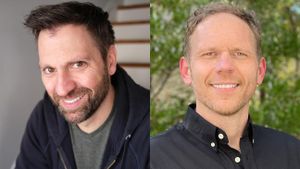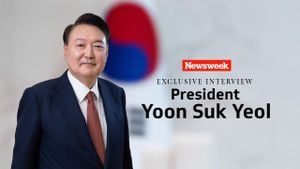The shocking assassination of Brian Thompson, the CEO of UnitedHealthcare, has sent ripples through the corporate world, highlighting the alarming accessibility of firearms, particularly 3D-printed ‘ghost guns.’ The incident, which occurred on December 4, 2024, has drawn intense media attention as authorities work to link the suspect, Luigi Mangione, to the crime.
On the morning of the fatal shooting, Thompson was arriving at the New York Hilton Midtown for the company's annual investor conference when he was ambushed. Witnesses reported hearing multiple gunshots as Thompson, 46, walked alone from his hotel room across the street. Eyewitness accounts describe the chaos of the moment, with passersby fleeing the scene and hotel staff scrambling to provide assistance.
Police believe Mangione, 26, had been watching Thompson before the attack. After Thompson was shot several times, the assailant fled the scene, highlighting how quickly violence can erupt in urban settings, especially against high-profile figures.
According to officials, the gun found with Mangione was matched through ballistic tests to shell casings recovered from the shooting scene. NYPD Commissioner Jessica Tisch stated, "We were able to match the gun to the three shell casings found at the scene of the homicide," emphasizing the efficiency of forensic science in such cases.
John D’Amato, who witnessed the event from his downtown office, reflects on the tragedy, saying, "It’s outrageous to think something like this could happen so openly, right during the heart of Manhattan. It's frightening for all of us who work here." This sentiment has been echoed throughout the city, fueling discussions about safety and gun regulations.
After the murder, police quickly initiated a manhunt for Mangione, who was eventually apprehended on December 9 at a fast-food restaurant in Altoona, Pennsylvania. Authorities noted he was charged with firearms violations and forgery prior to his extradition back to New York, where he awaits serious charges including second-degree murder.
Emerging evidence also suggests planning behind the crime. A notebook recovered from Mangione contained writings hinting at his rationalization for the attack, leading investigators to believe this was not merely spontaneous but rather premeditated. This insight has raised questions about his alleged motivations, including potential dissatisfaction with UnitedHealthcare’s practices or corporate culture.
Background checks on Mangione revealed troubling findings. An educated young man with degrees in computer science, he displayed signs of deep-seated discontent with socio-economic disparities and has been linked to various online discussions criticizing corporate practices. Some sources have even unearthed his comments on extremist views, including admiration for Ted Kaczynski’s controversial manifesto.
The case has ignited public discourse on the rise of ghost guns. These unregistered firearms, often assembled from kits available online, have increased significantly among criminal networks, making it more difficult for law enforcement to track their distribution. The ability for individuals like Mangione to create such weapons raises alarming questions about federal regulations and enforcement effectiveness.
Hello, Mr. Thompson’s death has provoked health industry leaders to reevaluate corporate security measures. Companies are now focusing on enhanced protective strategies and protocols to secure their executives and staff, particularly when high-profile events are involved.
Mayor Eric Adams commended law enforcement’s swift response, stating, “The number of hours they put in, around the clock, dedicated to bringing this person to justice, off the streets of our city, is commendable.” The mayor's remarks mirror the wider call for heightened security measures across various sectors, especially for organizations with significant public exposure.
While Mangione continues to fight extradition, legal experts suggest he may opt to plead not guilty by reason of insanity, considering the mounting profile of his mental state presented during preliminary hearings. The legal proceedings will undoubtedly bring intense scrutiny, with commentary from mental health professionals and legal analysts parsing the potential outcomes.
Meanwhile, the families and colleagues of those affected by this heinous act remain shaken. A spokesperson for UnitedHealthcare released sentiments of grief, stating, "We are devastated by Brian's tragic loss. He was not only a leader but also a family man and devoted friend. We stand together during this challenging time." This collective mourning reflects the broader concern for emotional support during such incidents, stressing the importance of mental health resources as corporate environments grapple with sudden tragedies.
The UnitedHealthcare CEO shooting serves not just as a singular tragic event, but as part of a growing concern over workplace violence and the increasing prevalence of firearms, leading to calls for reforms and comprehensive approaches to tackling these pressing issues. The public, as well as many organizations, continues to monitor the development of the case closely, hoping for justice and preventive measures to be put forth to avoid similar futures.



